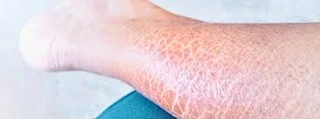Ichthyosis Vulgaris
Introduction
Ichthyosis vulgaris (sometimes called "fish scale disease" or "fish skin disease") is characterised by excessive dry, scaly skin.
- It is the most common form of the inherited ichthyosis.
- Results from loss-of-function mutations in the gene encoding the protein filaggrin (FLG).
- Some patients may "acquire" ichthyosis vulgaris because of a medical illness (e.g. kidney failure, leprosy, human immunodeficiency virus) or in response to a medication (e.g. cimetidine, clofazimine).
Clinical Features
The main feature of ichthyosis vulgaris is dry, thick and scaly skin.
- In ichthyosis vulgaris, skin cells reproduce at a normal rate, but they do not separate at the skin's surface, as they normally do. Also, dead skin cells do not shed quickly enough, causing a buildup of scales.
The condition is usually not present at birth. Most often it appears after about 2 months and in most cases before the age of 5.
- Symptoms may worsen up to puberty, and sometimes improve with age.
For the most part, people who have ichthyosis vulgaris live a normal life. However, they may suffer psychologically because of the skin's appearance.
NOTE: Whether ichthyosis vulgaris begins in a child or adult, it can be so mild that is mistaken for extremely dry skin. Many people never realize they have ichthyosis because applying moisturizer keeps their skin free of scale.
Treatment
Ichthyosis vulgaris does not have a known cure, so the treatment aims to reduce dryness, scaling, splitting and thickening of the skin. This is achieved with exfoliation and moisturising on a regular, daily basis.
- Treatments to keep the skin hydrated
- Immediately (within 2-3 minutes) after bathing, apply a liberal amount of moisturizer.
- Apply emollients with high lipid content, such as lanolin cream (a sebum-like substance derived from wool-bearing animals).
- Treatments to reduce scale
- Apply creams or lotions containing salicylic acid, glycolic acid, lactic acid or urea to exfoliate and moisturise skin. These may irritate active eczema.
- Gently rub an abrasive sponge or pumice stone on wet skin to help remove thickened crusty skin.
- Oral retinoids such as acitretin or isotretinoin can be prescribed in severe cases.

Comments
Post a Comment